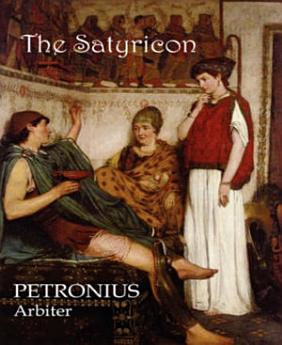The Satyricon
kesä 2019 · BookRix
E-kirja
248
sivuja
family_home
Kelvollinen
info
reportArvioita ja arvosteluja ei ole vahvistettu Lue lisää
Tietoa tästä e-kirjasta
The Satyricon is a Latin work of fiction in a mixture of prose and poetry. It is believed to have been written by Gaius Petronius Arbiter, though the manuscript tradition identifies the author as a certain Titus Petronius. As with the Metamorphoses of Apuleius, classical scholars often describe it as a "Roman novel", without necessarily implying continuity with the modern literary form. The surviving portions of the text detail the misadventures of the narrator, Encolpius, and his lover, a handsome sixteen-year-old boy named Giton. Throughout the novel, Encolpius has a hard time keeping his lover faithful to him as he is constantly being enticed away by others. Encolpius's friend Ascyltus (who seems to have previously been in a relationship with Encolpius) is another major character.
Of the many masterpieces which classical antiquity has bequeathed to modern times, few have attained, at intervals, to such popularity; few have so gripped the interest of scholars and men of letters, as has this scintillating miscellany known as the Satyricon, ascribed by tradition to that Petronius who, at the court of Nero, acted as arbiter of elegance and dictator of fashion. The flashing, wit, the masterly touches which bring out the characters with all the detail of a fine old copper etching; the marvelous use of realism by this, its first prophet; the sure knowledge of the perspective and background best adapted to each episode; the racy style, so smooth, so elegant, so simple when the educated are speaking, beguile the reader and blind him, at first, to the many discrepancies and incoherences with which the text, as we have it, is marred. The more one concentrates upon this author, the more apparent these faults become and the more one regrets the lacunae in the text. Notwithstanding numerous articles which deal with this work, some from the pens of the most profound scholars, its author is still shrouded in the mists of uncertainty and conjecture. He is as impersonal as Shakespeare, as aloof as Flaubert, in the opinion of Charles Whibley, and, it may be added, as genial as Rabelais; an enigmatic genius whose secret will never be laid bare with the resources at our present command.
Of the many masterpieces which classical antiquity has bequeathed to modern times, few have attained, at intervals, to such popularity; few have so gripped the interest of scholars and men of letters, as has this scintillating miscellany known as the Satyricon, ascribed by tradition to that Petronius who, at the court of Nero, acted as arbiter of elegance and dictator of fashion. The flashing, wit, the masterly touches which bring out the characters with all the detail of a fine old copper etching; the marvelous use of realism by this, its first prophet; the sure knowledge of the perspective and background best adapted to each episode; the racy style, so smooth, so elegant, so simple when the educated are speaking, beguile the reader and blind him, at first, to the many discrepancies and incoherences with which the text, as we have it, is marred. The more one concentrates upon this author, the more apparent these faults become and the more one regrets the lacunae in the text. Notwithstanding numerous articles which deal with this work, some from the pens of the most profound scholars, its author is still shrouded in the mists of uncertainty and conjecture. He is as impersonal as Shakespeare, as aloof as Flaubert, in the opinion of Charles Whibley, and, it may be added, as genial as Rabelais; an enigmatic genius whose secret will never be laid bare with the resources at our present command.
Arvioi tämä e-kirja
Kerro meille mielipiteesi.
Tietoa lukemisesta
Älypuhelimet ja tabletit
Asenna Google Play Kirjat ‑sovellus Androidille tai iPadille/iPhonelle. Se synkronoituu automaattisesti tilisi kanssa, jolloin voit lukea online- tai offline-tilassa missä tahansa oletkin.
Kannettavat ja pöytätietokoneet
Voit kuunnella Google Playsta ostettuja äänikirjoja tietokoneesi selaimella.
Lukulaitteet ja muut laitteet
Jos haluat lukea kirjoja sähköisellä lukulaitteella, esim. Kobo-lukulaitteella, sinun täytyy ladata tiedosto ja siirtää se laitteellesi. Siirrä tiedostoja tuettuihin lukulaitteisiin seuraamalla ohjekeskuksen ohjeita.








